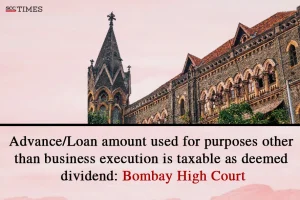Bombay High Court: In the present appeal, the appellant challenged the order passed by the Income-Tax Appellate Tribunal (‘ITAT’), which included the advance amount taken by him under the ambit of Section 2(22)(e) of the Income Tax Act, 1961 (‘Act’) as deemed dividend. The Division Bench of Alok Aradhe, CJ., and Sandeep V. Marne*, J., opined that utilization of advance for execution of a particular business transaction was a sine qua non for exclusion of the amount of loan or advance from the ambit of Section 2(22)(e) of the Act, therefore such advance in the instant case should be treated as deemed dividend. The Court thus dismissed the appeal and upheld the order of the ITAT.
Background
The appellant (assessee) was the Managing Director and a substantial shareholder in Ghatge Patil Industries Limited (‘GPIL’), a company engaged in the business of manufacturing castings and other components. Tata Engineering and Locomotives Company Limited (‘TELCO’) was amongst the major customers of GPIL, who used to place orders on J. B. Patil & Sons (Engineering Division), which was the proprietary concern of the appellant and he had continuous business transactions with GPIL. Thereafter, GPIL received an order exceeding Rs. 9 crores from TELCO and the value of machining charges and castings to be supplied by the appellant to GPIL was of Rs. 5.66 crores and the total value of orders already placed by GPIL with the appellant was of Rs. 1.18 crores. The appellant claimed that the value of orders outstanding upto 26-12-1997 was Rs. 73,58,973.
The appellant requested for an advance from GPIL against pending expected orders as he had to meet a deadline for payment of taxes by 30-12-1997. GPIL gave an advance of Rs. 71 lakh to the appellant on 26-12-1997 but TELCO did not go ahead with the orders placed with GPIL and the said transaction got cancelled. The appellant returned the advance to GPIL on 11-2-1998 i.e., in the same financial year.
The appellant claimed that the advance was received by him in the course of business to supply the motor parts for the order placed by TELCO and the said advance was also returned in the same financial year. However, the Assessing Officer made an assessment order under Section 143(3) of the Act, treating the advance taken by the appellant from GPIL as deemed dividend under Section 2(22)(e) of the Act and brought the same under the taxable income. The appellant preferred appeal before the Commissioner of Income-tax (Appeals) (‘CIT’) who substantially agreed with views of the Assessing Officer and confirmed treatment of the advance as deemed dividend. The appellant preferred further appeal before ITAT, which also confirmed the orders of the Assessing Officer and CIT.
Aggrieved by the order of the ITAT, the appellant filed an appeal under Section 260 of the Act before the present Court.
Analysis, Law and Decision
The issue for consideration was “whether a business advance granted by a Company to its shareholder, who did not utilize the advance for execution of job work for the company could be treated as deemed dividend under Section 2(22)(e) of the Act ?”.
The Court noted that the appellant was a shareholder of GPIL and a person entitled to beneficial owner of shares and that he held shares in excess of 10 per cent of voting power in GPIL. The Court noted that the Assessing Officer disagreed with the appellant’s contention that the advance was given for the purpose of business as the appellant had used the said amount for payment of income tax under Kar Vivad Samadhan Scheme (‘KVSS’). Further, the utilization of the said amount for KVSS was specifically admitted by the appellant.
The Court observed that the ITAT in its order stated that the appellant did not utilize the said amount for executing the machining job work for which it was specifically provided. Therefore, ITAT referred to the Circular No. 19/2017 dated 12-6-2017 and held that such advance could not be treated as deemed dividend under Section 2(22)(e) of the Act.
The Court observed that the said Circular could only be applied in the case where the advance was actually utilized for the purpose of the work, while trading advances in the nature of commercial transactions would not fall within the ambit of provisions of Section 2(22)(e) of the Act. In the instant case, the appellant had admittedly utilized the amount of advance for payment of income tax under KVSS and not for execution of any job work for GPIL.
Furthermore, it was stated by the Court that mere maintenance of running account by the appellant with the GPIL, having continuous business transactions with them or mere repayment of the advance within the same financial year could not be the reasons to admit that the amount of advance was actually utilized for execution of business transaction.
The Court opined that in the instant case, all the ingredients of Section 2(22)(e) of the Act were satisfied, and the amount of advance was not utilized by the appellant for execution of any job work for GPIL. Accordingly, the Court dismissed the appeal and held that utilization of advance for execution of a particular business transaction was a sine qua non for exclusion of the amount of loan or advance from the ambit of Section 2(22)(e) of the Act, therefore such advance in the instant case should be treated as deemed dividend.
[Jaykumar B. Patil v. CIT, 2025 SCC OnLine Bom 2889, decided on: 7-8-2025]
*Judgement authored by- Justice Sandeep V. Marne
Advocates who appeared in this case :
Advocate for the Appellant- R.S. Padvekar, Tanzil Padvekar, Tejal P. Kharkar
Advocate for the Respondents- Arjun Gupta

